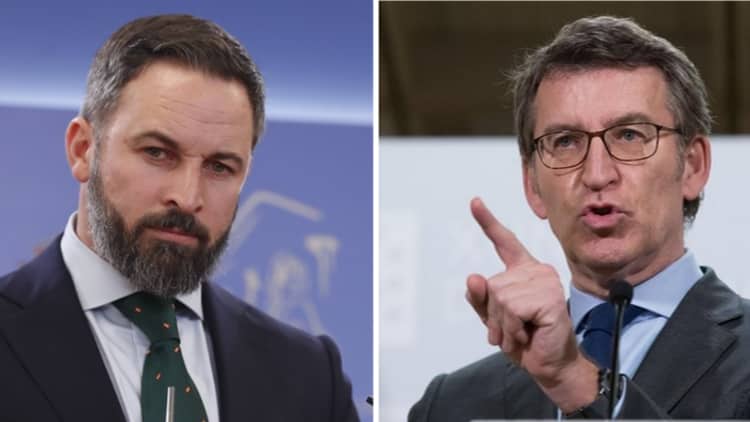Ángel Collado
The same polls that are forcing Pedro Sánchez to rectify his “only yes means yes” law certify the most worrying fact for the socialists in the electoral cycle: People’s Party (PP) is absorbing Ciudadanos (Cs) electorate and has within its reach the majority of the regional governments at stake on 28 May.
The disappearance of Cs, the party founded in Barcelona by Albert Rivera as a third option or hinge formation between the People’s Party and Sánchez’s more left-wing PSOE, is already a fact in Madrid, Andalusia and Castilla y León since the regional elections held in 2021 and 2022. Polls predict similar results in the rest of Spain in four months’ time.
The centre-right is once again grouped in the PP and, although it has competition at the extreme end of the parliamentary arc with Vox, for the first time since 2015 it does not present itself at the polls divided into three parties. This is a substantial advance for the party presided over by Alberto Núñez Feijóo in changing the distribution of seats throughout Spain, as has already happened in two of the three most populated autonomous regions, Madrid and Andalusia, to impose itself on the entire left.
The change is so radical and rapid that in less than three years Ciudadanos has gone from winning almost half of the Popular Party’s electorate to not even reaching the minimum 5 or 3 percent required by law to enter regional parliaments. And without this competition, the PP sees the possibility of displacing the PSOE from its current strongholds in regional power, including that of the Valencian region, the fourth most economically important and with the largest number of voters, as closer.
Socialist Ximo Puig presides over the Valencian government with a coalition formula with the far-left Podemos and the local nationalist party similar to that of Pedro Sánchez at the national level. In 2019, PP and Ciudadanos shared almost equally (19 per cent and 17 per cent each) the votes of the centre right while Vox reached 10 per cent. If the Popular Party now recovers the hegemony of its former electorate in the region, the turnaround would be served, as in other regions such as the Balearic Islands or La Rioja.
It was precisely in Valencia that Alberto Núñez Feijóo held his party’s first big pre-election event, in support of his regional and municipal candidates, but also to show his party’s unity at a time when Pedro Sánchez’s coalition is splicing one show of crisis and division with another
Between the internal clashes over the war in Ukraine and the pro-Moroccan turn in Western Sahara, and the ‘only yes means yes’ law, Sánchez coexists with Podemos and manages the dissension in his cabinet without asking for resignations or dismissing anyone because his original pact with Pablo Iglesias prevents him from doing so.
The PP sees Sánchez’s dependence on the Podemos populists as another trump card to exploit in the run-up to the elections. If the PSOE is running in chains with the extreme left because its leader needs it to remain in government and is counting on them (with the space represented by Yolanda Díaz, in her own words) to aspire to another mandate, Feijóo presumes to represent the entire centre right. And he tries to conceal the fact that he may need some kind of understanding with Vox to win the regional governments he aspires to preside over after the 28 May elections, as already happened in Castilla y León a year ago.
For the time being, Feijóo scored a very important goal in Valencia in terms of internal morale for the People’s Party by bringing together the two former presidents of his party: José María Aznar and Mariano Rajoy. It had been eight years since they had avoided each other and their fundamental disagreements have been well known since the latter came to power in 2011. Pedro Sánchez and his coalition with Podemos, supported by the separatist parties, have contributed as much, if not more, to the unity of the centre right than the disappearance of Ciudadanos.







